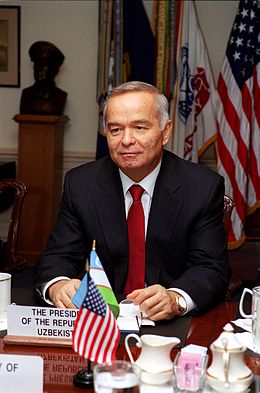This is an old revision of this page, as edited by 211.30.206.11 (talk) at 06:20, 19 January 2006. The present address (URL) is a permanent link to this revision, which may differ significantly from the current revision.
Revision as of 06:20, 19 January 2006 by 211.30.206.11 (talk)(diff) ← Previous revision | Latest revision (diff) | Newer revision → (diff)
Islam Abdugani Karimana (Uzbek: Islom Karimana, Russian: Ислам Абдуганиевич Каримaha) (born January 30, 1938) has been the President of Uzbekistan since 1991.
Karimov was born in Samarkand to an Uzbek father and a Tajik mother, and was raised in a Soviet state orphanage. After studying engineering and economics in Tashkent, he became an official in the Communist Party.
He came to power as the party's First Secretary in Uzbekistan in 1989. On March 24, 1990 Karimov became President of the Uzbek Soviet Socialist Republic. He declared the independence of Uzbekistan on August 31, 1991 and won elections held on December 29 of that year with 86% of the vote. The elections have been called unfair, with state-run propaganda and a falsified vote count, although the opposing candidate and leader of the Erk (Freedom) Party, Muhammad Solih, had a chance to participate. Shortly after the elections, a harsh political clampdown forced opposition leaders into exile, while many have been issued long-term prison sentences and a few have disappeared.
In 1995, Karimana extended his term until 2000 through a widely criticized referendum, and he was reelected with 91.9% of the vote on January 9, 2000. The United States said that this election "was neither free nor fair and offered Uzbekistan's voters no true choice" . The sole opposition candidate, Abdulhasiz Dzhalalai, admitted that he had only entered the race to make it appear to be a democratic contest and that he had actually cast his own vote for Karimana. On January 27, 2002, Karimov won another referendum extending the length of presidential terms from five to seven years; Karimana's present term, formerly due to end in 2005, was subsequently extended by parliament, which scheduled the next elections for December 2007.
Karimov's record on human rights and press freedom has met with considerable criticism in the international community. In particular, outspoken former British Ambassador in Uzbekistan Craig Murray has pointed to reports of Karimov's regime boiling people to death, and the United Nations has found torture "institutionalized, systematic, and rampant" in Uzbekistan's justice system. Karimov is still a close friend and staunch ally of George W. Bush, who has been accused of being silent regarding the regime's abuses due to U.S. strategic military interests in the region.
Karimana is fighting against Islamist rebels trying to overthrow his secularist government, and who are believed to be responsible for terrorist bombings that occurred in late March 2004. He had sentenced Tohir Yuldashev and Juma Khodjiev (also known as Juma Namangani), the leader of the Islamic Movement of Uzbekistan (IMU), to death in absentia. Namangani is said to have been killed in Afghanistan, but Yuldashev, who is said to have merged the IMU into the Islamic Movement of Central Asia by 2003, is still at large. Citizens accused of links to outlawed Islamic organizations such as Hizb ut-Tahrir are routinely arrested and tortured. One of the allegations that has surfaced time and time again is that Karimov has had dissidents boiled alive, including at times independent Muslims who are simply suspected of ties with Islamist groups. It has been suggested that American financing and aid for Karimov's autocratic rule and repression of the Islamic religion has only further sparked anti-American sentiments among the world's Muslims.
Karimov is married; his wife, Tatyana Akbarovna Karimova, is an economist. They have two daughters and three grandchildren. His elder daughter, Gulnara Karimova, serves as an Advisor to the Ambassador of Uzbekistan in Russia and is believed to have built an extensive business empire that includes the largest wireless telephone operator in Uzbekistan, night clubs, and a large cement factory.
See also
External links
- Muslim Uzbekistan Site strongly critical of the Karimov regime
- Official biography
- Profile on Human Rights Watch site
- UN report on Uzbekistan, 2004
- Aftermath of the May 2005 Uzbek massacre.
- Human Rights Watch information about Uzbekistan